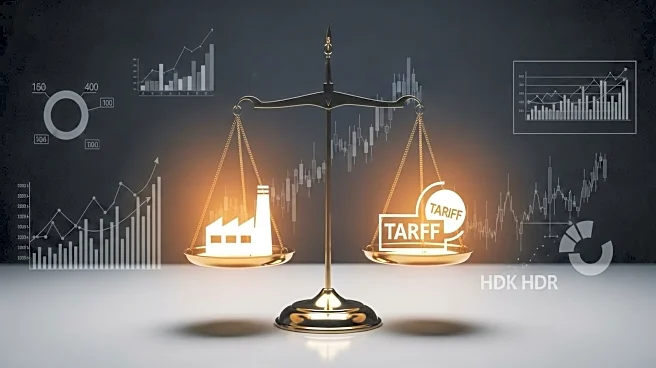What's Happening?
A report from the Centre for Economic Policy Research (CEPR) has concluded that President Trump's tariffs have not succeeded in increasing manufacturing employment in the United States. The analysis, published on the VoxEU website, indicates that while tariffs may provide short-term benefits to certain industries, these are negated by broader economic factors such as retaliatory tariffs, increased input costs, and shifts in consumer spending. The report highlights that the decline in US manufacturing jobs is largely due to productivity improvements, automation, and structural changes in the economy, rather than trade competition. Despite the political appeal of tariffs, the evidence suggests that they do not have a lasting positive impact on manufacturing employment.
Why It's Important?
The findings of the CEPR report are significant as they challenge the effectiveness of tariffs as a tool for revitalizing American manufacturing jobs, a key promise of President Trump's economic agenda. The report suggests that tariffs may not be the solution to countering Chinese manufacturing power or reversing long-term employment trends in the US. This has implications for policymakers who are debating the future of tariffs and industrial strategy. The report's conclusions may influence public policy discussions and decisions regarding protectionism and economic strategies aimed at boosting domestic employment.
What's Next?
As the debate over tariffs and industrial strategy continues, policymakers may need to consider alternative approaches to support US manufacturing employment. The CEPR report could prompt discussions on the role of automation, productivity improvements, and structural economic changes in shaping employment trends. Stakeholders, including political leaders and industry groups, may explore other strategies beyond tariffs to address the challenges facing the manufacturing sector. The report may also influence future trade negotiations and economic policies aimed at balancing protectionism with global competitiveness.
Beyond the Headlines
The report raises questions about the long-term sustainability of using tariffs as a political tool to address economic challenges. It suggests that while tariffs can provide visible and immediate relief, they may not address the underlying issues affecting manufacturing employment. This highlights the need for a comprehensive approach to economic policy that considers technological advancements and structural changes in the economy. The findings may also prompt discussions on the ethical implications of protectionist policies and their impact on global trade relations.











